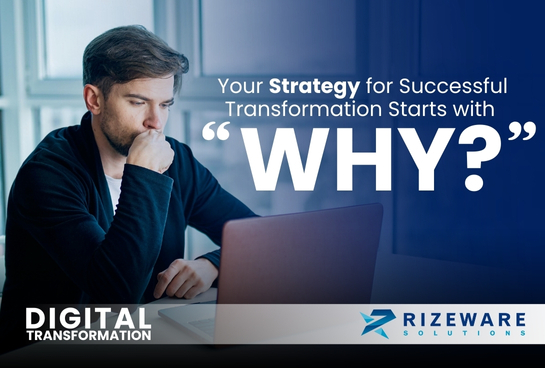Digital Transformation Blog Series – Erik Ruda, CEO, Rizeware Solutions
About 15 years ago, author Simon Sinek wrote “Start with Why,” a thought-provoking book that suggests “why” is the first and most important question every business should ask as it reflects on its reason for existing, its unique value to customers, and its strategic direction moving forward. This strategic “why” is especially important for the growing number of organizations considering investments in complete digital transformation.
As a reminder from last week’s blog, and to ensure we are in sync moving forward, here is our working definition of that term:
Digital transformation is the process of integrating digital technology into all areas of a business, fundamentally changing how it operates and delivers value to customers. It’s not just about adopting new technologies; it’s about reimagining business processes, culture, and customer experiences in the digital age.
There is no question that digital transformation is necessary for business survival and success. As such, it is a journey that can be rewarding or disruptive…or both. So, before taking that first step, we encourage you to pause for a moment and consider why your business exists, its purpose, and what success looks like. If your leadership team is aligned on these perspectives, it will be easier to plan and execute a digital transformation vision that will minimize disruption and maximize business success.
We can’t emphasize enough the need for internal discussions and alignment before starting your journey. In fact, separate research projects conducted by the Harvard Business Review, McKinsey & Company, and the Boston Consulting Group all came to the same conclusion – about 70% of digital transformation projects are perceived as failures by their organizations. But why?
Every digital transformation initiative is different simply because every organization is different, with lots of moving parts and their own unique processes, pain points, and priorities. But in the end, these initiatives don’t deliver the value they should for many reasons. Here are 10 common examples of why organizations often fail on their digital transformation journey.
1. Absence of a clear strategy and vision, with no measurable goals or objectives.
2. Lack of support from top executives, with no champion leading the charge.
3. Employee resistance to adopting new technologies and changing business processes.
4. Operational silos with very little cross-functional collaboration and process integration.
5. Underestimating the complexity and time required for legacy system integration.
6. Failure to develop and implement a change management plan to ease transitional pains.
7. Focusing on technology without considering business needs and operational problems.
8. Lack of customer focus; failing to consider how changes impact customer experience.
9. Inadequate budget allocation and investments in skilled resources to achieve objectives.
10. Neglecting cybersecurity requirements to protect digital systems, users, and content.
Each of the 10 pitfalls listed is probably worthy of a deeper discussion–and we plan to cover some of these topics in more detail in subsequent blogs. But since this is just step 1, the focus here must be on your “why.” A little self-reflection and candid discussion among members of your leadership team should bring unified clarity regarding your long-term business goals and success metrics.
Just as important, this corporate self-reflection will likely influence your more immediate strategy, priorities, timeline, and investment plans to ensure your digital transformation journey provides the foundation needed to meet and exceed your long-term business objectives.
And remember, you are not alone. Various organizations–including Rizeware Solutions–are available to partner with you every step of the way, from strategic project planning to customized technology implementation. The resources and experience those firms provide can be a tremendous asset on your digital transformation journey and help you meet and exceed your long-term business objectives.
In our next blog, we’ll take a closer look at the risks and rewards of organizational change. Yes, it can be disruptive and met with employee resistance. But it can also be a catalyst for unprecedented growth and business success. And it’s also at the heart of digital transformation. More on that topic next week! In the meantime, we encourage you to follow Rizeware Solutions and share any feedback along the way.

